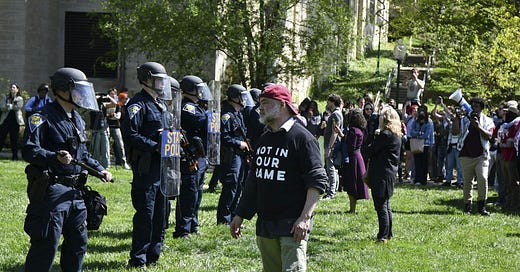Open Letter From 30 Jewish IU Professors
An open letter signed by about 30 IU Jewish professors to President Pamela Whitten, Board Chair Quinn Buckner and Provost Rahul Shrivastav
Even as the Department of Education is being dismantled, one thing the Trump administration is attempting to do is use the agency to crack down on pro-Palestine organizers for their speech under the guise of combatting antisemitism.
In response to the news that IU is currently under such investigation, 30 IU professors implore the university’s leadership to maintain its commitment to free speech in the face of federal pressure. Source
Chair Buckner, President Whitten, Provost Shrivastav,
On March 10, the Department of Education’s Office for Civil Rights threatened withdrawal of federal funding from IU and 59 other institutions if they fail “to protect Jewish students on campus.” Four days later, Indiana Gov. Mike Braun issued Executive Order 25-39, ostensibly aimed at “ensuring safety” for Jewish students at Indiana public universities. As Jewish IU Bloomington faculty, we urge you not to invoke our names, or those of IU’s Jewish students, as justification for any action that further limits academic autonomy or freedom of expression at IU.
We, the undersigned, have all been “Jewish students on campus” somewhere. Our children have been Jewish students on campus somewhere. We teach Jewish students on this campus. And we—unlike Gov. Braun or Education Secretary Linda McMahon—have known antisemitism firsthand. But we also know that our identities, both as Jewish Americans and as public university employees, require respect for free speech and tolerance of opposing viewpoints.
Those values lead us to remind you that IU has a responsibility to stand firmly for freedom of speech.
In coming months, Secretary McMahon and Governor Braun will seek your compliance in enforcing their vaguely defined prohibitions against “antisemitic harassment and discrimination” from “radical organizations and individuals.” The lessons of last year’s overreaction to the protests on Dunn Meadow, withdrawal of Samia Halaby’s Eskenazi Museum retrospective, suspension of Prof. Abulkader Sinno, and imposition of an overbroad expressive activity policy are clear: censoring legal expression—even in the name of bringing us together—only tears us apart.
As you prepare your response to the DoE letter and Executive Order, we remind you that IU has long maintained the “scrupulous adherence to federal anti-discrimination laws” that the Secretary demands. In fact, the 1964 Civil Rights Act—to which the Secretary purports to adhere—came only after decades of contentious protest carried out in, among other places, universities like IU.
Finally, we remind you that “Jewish students,” like Jewish staff and faculty, are not of one mind and cannot be “protected” by one edict. We are as varied in our political opinions as are any members of the IU community.
These are fraught times for universities and other American institutions asserting their commitments to the protection of the First Amendment. Still, we recall the words of Hillel: “If I am not for me, who will be for me? And when I am for myself alone, what am I?” This university’s best means to protect the well-being of all of its students will be to affirm its commitment to civil liberties and to protect its academic programs from political interference.
We count on you to do so.
Sincerely,
Amy G. Applegate, Clinical Professor of Law
Robert Arnove, Chancellor's Professor Emeritus of Educational Poicy & Leadership Studies
Marcia Baron, James H. Rudy Professor of Philosophy
Richard Bauman, Distinguished Professor Emeritus, Folklore and Anthropology
Michel Chaouli, Professor of German and of Comparative Literature
Deborah Cohn, Provost Professor of Spanish & Portuguese
Michael Dwyer, Associate Professor, Geography
Bob Eno, Associate Professor (retired), East Asian Languages and Cultures
Robert Fischman, Professor of Law
Diane Goldstein, Professor Emeritus of Folklore and Ethnomusicology
Clare Griffin, Assistant Professor, History/REEI
Susan Gubar, Distinguished Professor Emerita of English
Jean-Louis Haguenauer, Professor of Music (Piano)
Michael Hamburger, Professor, Earth & Atmospheric Sciences
Diane Henshel, Associate Professor, O'Neill School of Public and Environmental Affairs
Jeffrey C. Isaac, James H. Rudy Professor of Political Science
Jason Baird Jackson, Ruth N. Halls Professor of Folklore and Anthropology
Ben Kravitz, Associate Professor, Earth and Atmospheric Sciences
Lara Kriegel, Robert H. Ferrell Professor of History
Bradley Levinson, Professor Emeritus, Educational Leadership and Policy Studies
Alex Lichtenstein, Professor, History & American Studies
Ethan Michelson, Professor, Sociology and East Asian Languages and Cultures
Larry Moss, Professor, Mathematics, and Director, Program in Pure and Applied Logic
Aviva Orenstein, Professor of Law
Benjamin Robinson, Associate Professor, Germanic Studies
Jean Robinson, Professor Emeritus, Political Science
Mark Roseman, Distinguished Professor, Pat M. Glazer Chair, History and Jewish Studies
Eric Sandweiss, Miller Professor of History
Jonathan Schlesinger, Associate Professor of History
Rob Schneider, Professor of History
Micol Seigel, Professor, American Studies and History
Susan Seizer, Professor Emerita of Anthropology
Bruce Solomon, Professor Emeritus of Mathematics
Leah Shopkow, Professor of History
Daniel Suslak, Associate Professor of Anthropology
Sam Tobin-Hochstadt, Associate Professor, Computer Science
Michael Weinman, Senior Lecturer, Jewish Studies and Political Science
David Zaret, Professor Emeritus of Sociology, Vice President for International Affairs (retired)


